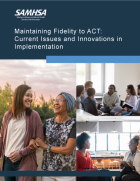This practical guide reviews the principles of Assertive Community Treatment (ACT), presents key considerations for adapting ACT across various treatment settings, populations, and related domain areas, and provides practical guidance for navigating cross-cutting issues.
Dashboard: Filter Bricks
Main page content


This model standards guidance document, SAMHSA's National Model Standards for Peer Support Certification, is prepared in response to President Biden's 2022 Unity Agenda. This document outlines model standards for substance use disorder, mental health, and family/youth peer support certification.

The guide provides considerations and strategies for interdisciplinary teams, peer specialists, clinicians, registered nurses, behavioral health organizations, and policy makers in understanding, selecting, and implementing evidence-based interventions that support older adults with serious mental illness.

This brief provides an overview of Forensic Assertive Community Treatment (FACT)—an intensive service delivery model intended for people with serious mental illness who are involved in the criminal justice system.

This guide offers best practices for treating women living with substance use disorders in co-ed treatment and recovery settings. It highlights the importance of gender differences, cultural sensitivity, and developing healthy relationships.

This manual introduces a concept of trauma and offers a framework for becoming a trauma-informed organization, system, or service sector. The manual provides a definition of trauma and a trauma-informed approach, and offers 6 key principles and 10 implementation domains.

This manual explains peer recovery support services designed and delivered by people in recovery from substance use disorders. It discusses types of peer support for recovery, the adaptability and value of peer recovery support services, and cross-cutting core principles.

